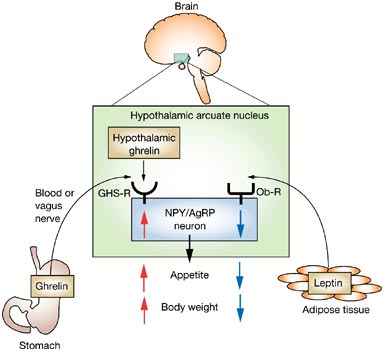Here is a slide that describes this from http://www.precisionnutrition.com/leptin-ghrelin-weight-loss

Anyways, back to expectations, how are these formed?
For the adult, we impose these on ourselves by self abuse tools like to-do lists and goals. We list out much more than we could hope to do, and then when we do not perform up to our unrealistic expectations, we get down on ourselves. " I should have done more." Bullshit. Your expectation was to high. We should not set goals. It was set beyond your control and ability, beyond our current skill sets. For now, quit making to-do lists, or at least with any expectations attached. Perhaps a jobs list is ok, but that may take years to complete, or weeks, but do not attach expectations.
How does this expectations problem start?
Perhaps as children, we were over responsible. Our parents told us to behave and learn to read, and we took that to be the first day. We internalized our parents unrealistic goals for us to be at the top of our class, and we pushed it onto our super-ego, and make it "our" goal. All we need do is let go of that internal expectation for relief of the entire problem, as far as that goes.
Excessive appetite, and expectation induces stress is only one of the many ways stress can be induced in our lives. Even Buddha identified expectations of one many causes of unsatisfactoriness and hence mental suffering into our lives. These are stored in the Freud super-ego ( http://en.wikipedia.org/wiki/Id,_ego_and_super-ego ) or in the triune unconscious (http://en.wikipedia.org/wiki/Triune_brain) but that does not matter. It is these kinds of beliefs, of expectations, that we can let go of and make life better for ourselves.
Some things are within our control, and some things are not. Making expectations for ourselves is certainly within our control, and likely serve little useful purpose. We need not stress over non-achievement for sure. In our youth it is likely parental expectations that we absorbed. At some point, we take on that role on, with out super-ego. When the teenage realizes this, consciously or not, is that where the diffidence comes from? They may see parental expectations as unattainable, but do we see our own as unattainable. It is an internal problem, one of over responsibility, or trying to be responsible for that which is beyond my control.
Drown those expectations and do not make any more. Enough.
No comments:
Post a Comment